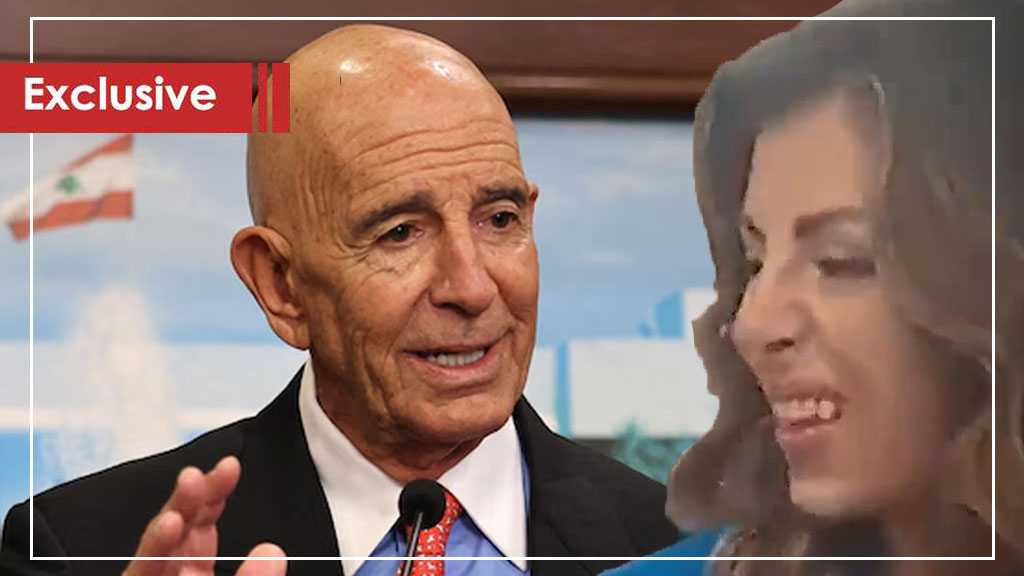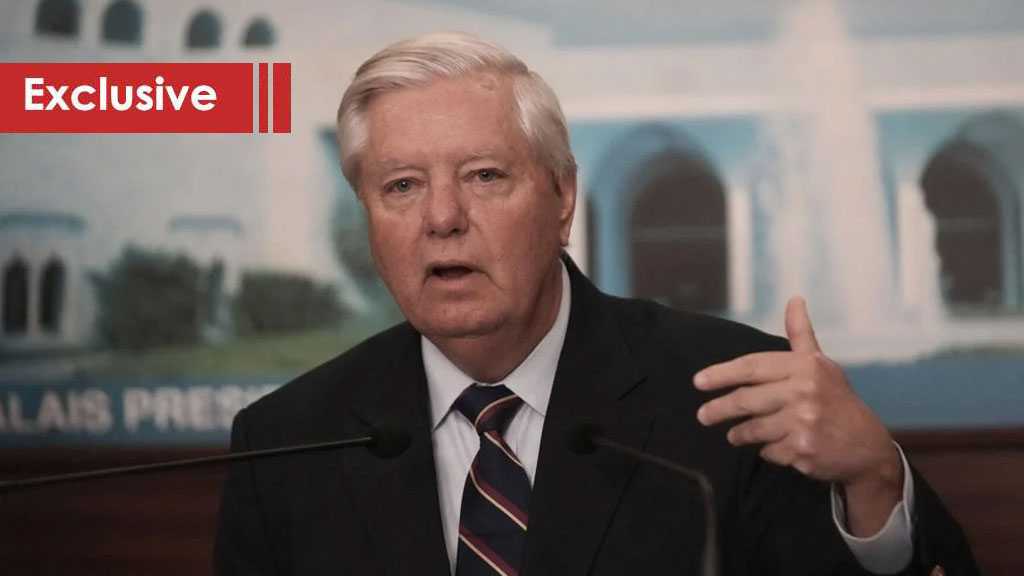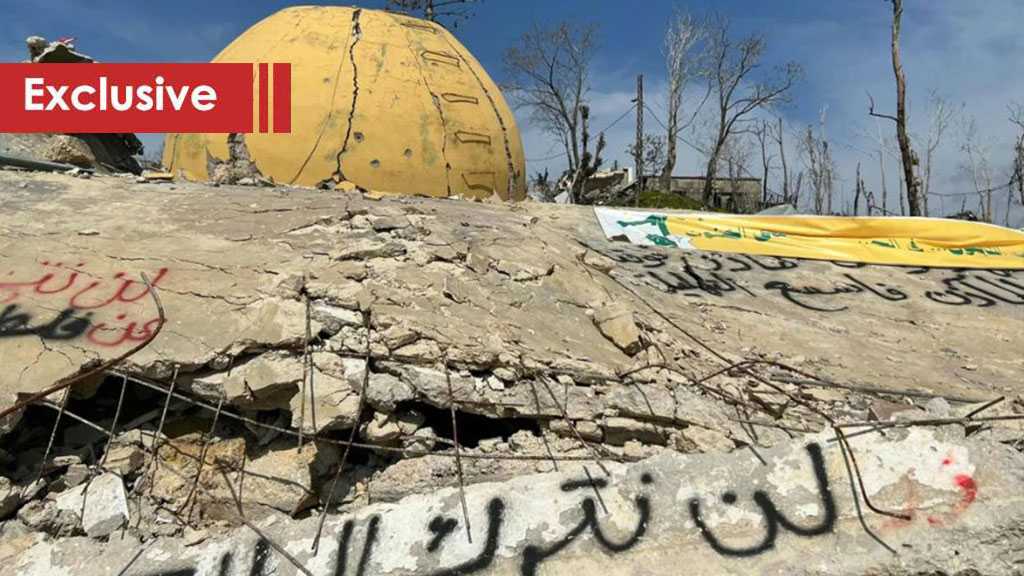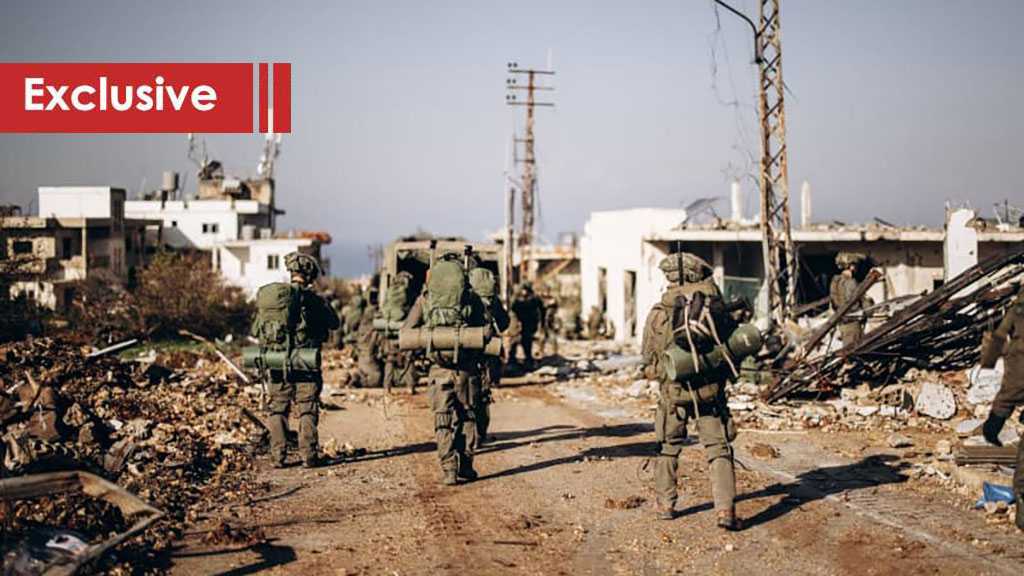
In-Depth Interview with Hezbollah MP Hassan Fadlallah: Sayyed Nasrallah and the South’s Liberation

By Fatima Salami
Lebanon – Just ask Loyalty to the Resistance Bloc member MP Hassan Fadlallah about Resistance and Liberation Day, and he will recount, with passion and nostalgia, stories from those glorious days. As a native of Ainata, a southern town long scarred by the cruelty of occupation, Fadlallah speaks with deep emotional conviction. He recalls his earliest memories under the roar of "Israeli" warplanes and the horror of raids that bombed homes and displaced families. His village had been occupied since 1978, and his consciousness matured amidst the violence of that era.
At the heart of the liberation, he says, stood the “master of the nation’s martyrs,” the supreme martyr Sayyed Hassan Nasrallah. He calls him the architect of victory—closely accompanying every detail of the liberation and following the progress of the Resistance and people’s advance through direct phone communication. Fadlallah reflects at length on Sayyed Nasrallah’s leadership—before the 2000 liberation and all the way through to the post-Operation Al-Aqsa Flood era.
He recounts how Sayyed Nasrallah once stated:
“What matters to us is God’s satisfaction and defending the oppressed in Gaza.”
But when he speaks of the Sayyed, Fadlallah often falls silent, choked with emotion.
Turning to current events, Fadlallah highlights ongoing "Israeli" aggression.
“The Lebanese state bears full responsibility for the South today,” he says. “Those advocating a diplomatic path must prove its effectiveness. But after all these months—while the enemy continues its killing, detains captives, and commits daily assaults—has this diplomatic option proven feasible? Our experience says: this is a failed bet.”
As for the smear campaigns against the Resistance, Fadlallah sees them as indirect affirmations of its strength:
“If the Resistance truly had no presence, why such relentless attacks against it?”
Below is the full interview:
Q: What does Resistance and Liberation Day represent in your personal and political conscience?
A: This anniversary always comes with a lump in the throat and tears in the eyes. This is the first time we commemorate it, 25 years on, with its leading figures—resistance commanders—now martyrs. At the forefront is the master of the nation’s martyrs, Sayyed Hassan Nasrallah (God bless his soul). His leadership propelled the Resistance into a new phase, merging military effectiveness with public engagement. He believed in his people, and they, in turn, trusted his sincerity. They rallied around the Resistance as it faced and triumphed over "Israeli" aggression in 1993 and 1996, ultimately achieving the April Understanding that shielded civilians—an achievement that laid the foundation for the 2000 liberation.
This anniversary also recalls the martyr Sheikh Nabil Qaouk, a key architect of the liberation. Then responsible for the South, he—under the supervision of Sayyed Hashem Safieddine—led the daring decision to advance toward the occupied villages. I met him in Ainata Square, and I myself was in direct communication with Sayyed Safieddine as we coordinated the liberation.
On the fourth day of liberation, I visited Sayyed Nasrallah at the General Secretariat. I briefed him on field developments and asked about handling collaborators. His response was deeply rooted in the prophetic tradition. He said:
“We take guidance from the example of your grandfather, the Messenger of God—peace be upon him—during the conquest of Mecca, when he declared: ‘Today is a day of mercy; go, for you are free.’”
He firmly rejected any form of revenge, even against those who had killed his uncle Hamza and mutilated his pure body.
Sayyed Nasrallah was closely engaged in every detail, coordinating by phone with each front of the popular advance. On those luminous nights of liberation, detainees freed from the notorious Khiam detention center were brought to the Shura courtyard, where Sayyed personally welcomed them and addressed their pain and resilience. He also sent trusted envoys to Christian villages to reassure residents that no harm would befall civilians, and that even collaborators would be turned over to the Lebanese Army—affirming the Resistance’s principled conduct and national responsibility.
As we commemorate the martyr commanders, we must pause at the remarkable role of the martyred leader Hajj Abu Al-Fadl Karaki. He dedicated his life to the battlefield, managing Resistance operations in the South from his leadership post. Alongside Hajj Imad Mughniyeh and other commanders, he worked tirelessly to ensure that the conditions for liberation were optimal—so it could unfold in its most dignified form.
Martyr Hajj Imad Mughniyeh was among the first to reach the area. He led operations on the ground while simultaneously working to implement the Secretary General’s directives—ensuring the liberation would enter history as a model of restraint and clarity, which it did in every sense.
Following the liberation, when French Ambassador Philippe Lecourtier visited Sayyed Nasrallah at the General Secretariat, he used the phrase “chapeau bas”—meaning “hats off to you”—and remarked: “In France, ten thousand were executed. With you, not even a single slap occurred.”
The liberation carries the enduring legacy of its martyr leaders. We remember them one by one: the jihadi commander Hajj Ibrahim Aqil, known throughout the squares of the South; Sayyed Fouad, a veteran jihadi commander who stood alongside the Resistance from its inception and was by Sayyed Nasrallah’s side when he delivered the historic liberation speech at Bint Jbeil’s city stadium; and Sayyed Mustafa Badreddine, a distinguished leader whose mark is deeply embedded in the Resistance’s journey.
The events of liberation also bear the imprint of every drop of blood that nourished the land throughout the struggle. Today, we affirm that this liberation remains the most significant achievement in Lebanon’s history and in the broader regional context. Unlike the liberation efforts following the establishment of the Zionist entity—where territories in Palestine, Jordan, Syria, Lebanon and Egypt were recovered only with conditions and political compromises—the Lebanese Resistance uniquely succeeded in reclaiming its land in 2000 without any concessions. This historic victory is etched deeply in the conscience of all honorable and free people worldwide and holds a special place in the hearts of the people of the South and the many villages and towns freed from “Israeli” occupation.
The foremost concern of His Eminence Sayyed Nasrallhwas always the people — their protection and securing a life of dignity for them. This was the driving force behind all his efforts; his ultimate goal was to seek God’s pleasure by serving the oppressed. During the brutal "Israeli" massacre in Gaza, His Eminence often reiterated in meetings: “We seek Almighty God’s pleasure and defending these oppressed people. We do what we must, within our capacity, for the sake of the people — because the Palestinian people are suffering; children and women in Gaza are being slaughtered, and they deserve a dignified and honorable life.”
When His Eminence Sayyed sought to prevent a wider war in Lebanon and insisted that support be measured strictly to stop the aggression on Gaza — not to drag the country into conflict — his primary concern remained the people. He did not want them to suffer or be harmed.
Sayyed Nasrallah was martyred because he was defending his people. He would often say: “We are fulfilling our mandate, and when we stand before God Almighty, He will ask: What did you do when you saw children slaughtered, land occupied, and people bombarded?” This was always his concern, and he was martyred in the Resistance’s operations room—performing his duty and carrying his mandate.
Q: How do you respond to those who seek to strip this liberation of its glow amid the current aggression on Lebanon?
A: Despite recent events—especially the latest "Israeli" aggression—this liberation remains a shining beacon in our contemporary history. No development can erase the reality that these towns and villages were freed, culminating in the historic victory of May 25, 2000.
We must remember: the enemy invaded vast Lebanese territories in 1982, reaching Beirut and occupying it by September. But from Beirut’s southern suburbs to the villages of the South, resistance efforts multiplied—from the liberation of Beirut just days later, to the liberation of Sidon in 1983, and eventually the great milestone of 1985, when the enemy retreated from most of Lebanon except for the border strip.
From 1985 to 2000, the Resistance gradually dismantled the occupation. What we witnessed was a unique accomplishment: the people of Lebanon expelling the occupier without negotiations or concessions. And over the years that followed, the Resistance established deterrent equations that safeguarded the country.
Some want to reduce everything to the current moment and ignore the arc of history. But such narrow views cannot stand against the historical truth. The will of the people will always triumph over occupation.
Q: On a personal level, what does liberation mean to you?
A: I come from a village that was under occupation since 1978. We lived in a climate of constant "Israeli" attacks. From the earliest days of our lives, our awareness was shaped by the sight of "Israeli" warplanes bombing our area, by the scenes of "Israeli" soldiers storming villages and towns, shelling homes and displacing residents.
This was our reality in the early 1970s until 1978, when the area was occupied, and the enemy soldiers and their collaborators committed the worst atrocities—killing, displacement, burning of homes and mass detentions.
On May 21, 2000, when we began advancing toward our towns, we did so under the protection of the Resistance. Within us, there was a deep sense of pride, dignity, and glory—feelings that cannot fade or be forgotten. Entering our towns with the people was not just a return to the land, but a return to life itself. We restored the bond we had been deprived of for over two decades with our land and our roots.
Even after all these years, the memory of that moment lives on—shared with the steadfast families and the returning crowds—we relive that spirit, that pride, that sense of honor and national dignity. And on every such occasion, with every achievement, we recall the image of those great and mighty martyrs who gave their lives for this cause.
Q. Resistance and Liberation Day occurs today, and Lebanon is exposed to daily “Israeli” attacks. In your opinion, to what extent does the resistance option precede diplomacy, which has so far failed to stop the attacks?
A. Let us recall that since 1948, Lebanon has been subjected to repeated “Israeli” attacks, culminating in the 1978 occupation. In response, international resolutions were issued, but the enemy ignored them. Then came the 1982 invasion, and again the enemy did not comply with any of those international resolutions, political pressures, or diplomatic initiatives. All political movements between 1978 and 2000 failed to liberate even a single inch of Lebanese territory.
Today, after the latest “Israeli” aggression on Lebanon—and as a result of the legendary and historic steadfastness of the resistance fighters in the frontline villages and across the confrontation zone—the enemy was unable to occupy our towns and villages. It is important to emphasize that what forced the enemy to retreat was the heroism of the resistance. What prevented the enemy from occupying the area south of the Litani—part of Lebanon that lies within “Israeli” territorial ambitions—was the Resistance.
Perhaps some forget that in 1982, the enemy arrived with prefabricated houses, intending to settle in certain Lebanese areas. However, due to the Resistance’s operations, that project was ultimately foiled.
In the recent war, it was the Resistance that prevented the enemy from occupying the land. The enemy exploited the truce and committed numerous violations, remaining in some occupied points. At present, the Lebanese government holds responsibility for this area and bears full responsibility for it. We were told that Lebanon would resort to diplomacy, the international community, international resolutions, and its foreign friendships to exert pressure and force the enemy to withdraw. Yet, months have passed since the ceasefire, and we have seen no result—no protection for Lebanon and no liberation of land.
Today, those who speak of the diplomatic option must prove its effectiveness. But until now, months later, the enemy continues to commit murders, refuses to release prisoners, and carries out daily attacks. So, will the diplomatic option prove its feasibility?
We told the government and officials that the matter is now in their hands and that they bear full responsibility to act and pressure the enemy to withdraw. Our historical experience tells us that international resolutions, diplomatic pressures, and relying on outsiders do not produce results. This is a failed bet.
However, the Lebanese state and its so-called friends abroad now have an opportunity to prove to the Lebanese people that it is indeed possible to liberate land, prevent attacks, and recover prisoners through diplomatic means. We continue to urge the government to exert every possible effort, and we call on state officials to do the same.
This dangerous situation, marked by ongoing "Israeli" attacks, continues to threaten Lebanon’s stability. It hinders any possibility of lasting peace—not just in the South, but across the entire country. It is a grave mistake to believe that destabilization in the South can occur without impacting all of Lebanon.
This was a mistake made in the past, and we hope no one in Lebanon repeats it today. A parallel priority for the government should be reconstruction, but there have been no practical steps taken in this regard. This delay raises serious concerns, and its lack of resolution is having negative effects on the country as a whole.
Q. Resistance and Liberation Day coincides this year with the Resistance facing great pressures, including internal and external attempts to undermine its reputation, alongside statements claiming that “Hezbollah and the Resistance are over.” How do you comment on this?
A. When we see an internal and external media campaign of this scale targeting the Resistance and its environment, it means that this Resistance is still strong and active, and that its environment remains cohesive. All the military warfare was unable to eliminate it, which is why today the enemy resorts to political pressure, economic siege, increased sanctions and defamation attempts. All these efforts are evidence that the Resistance is still present, and that its environment continues to engage with and support it.
If, as some claim, the Resistance was truly over, then why does this campaign continue? Why the ongoing incitement? This media, political, and financial war against the resistance is in fact an external war—one that is being waged with the help of internal actors who are implementing a foreign agenda.
Targeting the Resistance’s environment and this essential national component has nothing to do with Lebanon’s national interest. Rather, it is part of offering credentials to external powers or carrying out foreign instructions.



